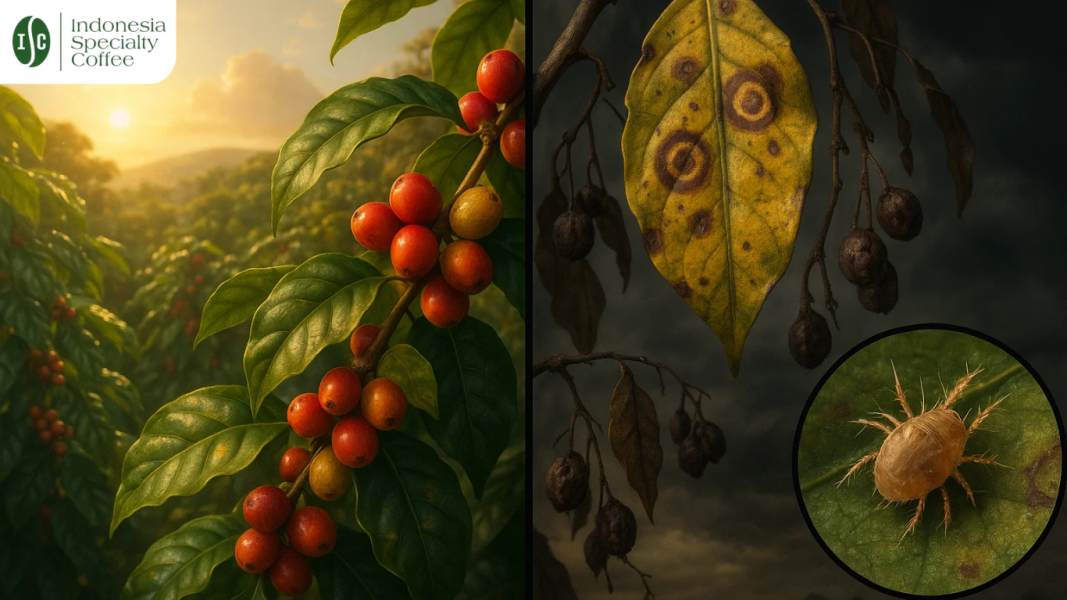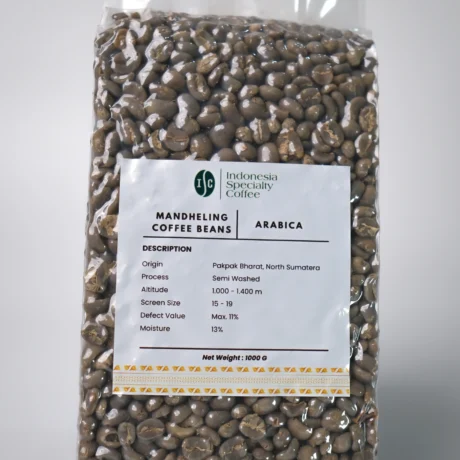Imagine this: you brew your morning cup using your perfect French press coffee ratio or a meticulous pour-over method, expecting familiar richness—only to be met with a flat, dull flavor. The culprit? Not your technique. It might be the coffee ringspot virus in specialty coffee, a silent threat that’s spreading beneath the leaves and into your cup.
As Indonesia’s specialty coffee becomes a global gem, biological pressures like the Coffee Ringspot Virus (CoRSV) are endangering the flavor, livelihood, and heritage behind every bean. Here’s why this matters more than ever.
What Is the Coffee Ringspot Virus in Specialty Coffee?
A Microscopic Invader, a Massive Impact
Coffee Ringspot Virus is a plant disease transmitted by Brevipalpus phoenicis—tiny, invisible mites that feed on coffee plants. Once infected, plants develop distinctive ring-shaped lesions on leaves and cherries. This weakens the tree, reduces cherry quality, and silently erodes the sensory profile of specialty coffee beans.
In countries like Brazil and Costa Rica, the virus has become a common challenge. But its potential reach extends far beyond Latin America—including to coffee-growing regions like Sumatra and Toraja.
How Coffee Ringspot Virus Impacts Quality and Flavor
The Chain Reaction That Affects Your Brew
No matter how precise your brewing ritual is, CoRSV interferes with the natural growth and development of coffee. Here’s how the damage unfolds:
- Leaves fall early, limiting photosynthesis.
- Cherries are exposed to sunburn, which impacts sugar development and flavor complexity.
- Secondary fungal and bacterial infections lower the bean’s structural integrity.
- Cupping scores drop, reducing their market classification as specialty grade.
This is devastating for farmers growing Aceh Gayo or Lampung coffee, where high flavor scores are essential for export and premium pricing.
Why Coffee Ringspot Virus in Specialty Coffee Is Getting Worse
The Role of Climate Change
Increased global temperatures are expanding the habitat of CoRSV and its vector. Research shows that even a slight increase in heat makes once-resistant coffee varieties vulnerable to the virus.
This spells trouble for climate-sensitive origins like Sumatra and Toraja, where temperature and rainfall are closely linked to coffee cherry development and quality.
Is Indonesia at Risk?
A Wake-Up Call for Asia’s Coffee Heartlands

While the coffee ringspot virus in specialty coffee hasn’t yet been confirmed in Indonesia, its vector—Brevipalpus phoenicis—already exists in Southeast Asia, renowned beans could suffer:
- Sumatra coffee may lose its signature earthy richness.
- Toraja coffee could be downgraded from specialty to commercial.
- Market access could be jeopardized for fermented coffee beans and other innovative micro-lots.
How Can Farmers and Roasters Respond?
Smart Farming, Transparent Sourcing
Fighting the coffee ringspot virus in specialty coffee is essential to maintain both quality and global competitiveness.
- Weed control to eliminate viral reservoirs.
- Integrated pest management (IPM) targeting Brevipalpus mites.
- Use of resistant varieties (still in development).
- Shading and biodiversity to reduce climate stress.
Roasters and buyers can contribute by choosing beans from farms practicing sustainable coffee production and demanding transparency across the supply chain.
Why This Virus Threatens More Than Your Morning Cup
It’s About Flavor, Livelihood, and Legacy
Losing a crop to Coffee Ringspot Virus isn’t just an agronomic problem—it’s a sensory and economic tragedy.
Producers may lose access to specialty markets, while drinkers lose the chance to explore Indonesia’s volcanic terroirs and specialty coffee processing innovations. Consumers must protect these legacies by supporting ethical sourcing and raising awareness.
What Can You Do as a Coffee Lover?
- Ask your roaster about virus prevention measures.
- Choose beans from trusted sources like this guide.
- Educate others about the silent threats facing coffee quality.
Final Brew: Coffee Ringspot Virus in Coffee Needs Your Attention
This isn’t just a farmer’s fight. Whether you’re a barista, café owner, or just love a complex cup of specialty-grade coffee, your voice—and your choices—matter.
Let’s protect the future of coffee—especially from threats like the coffee ringspot virus in specialty coffee. One bean, one farm, one cup at a time.




